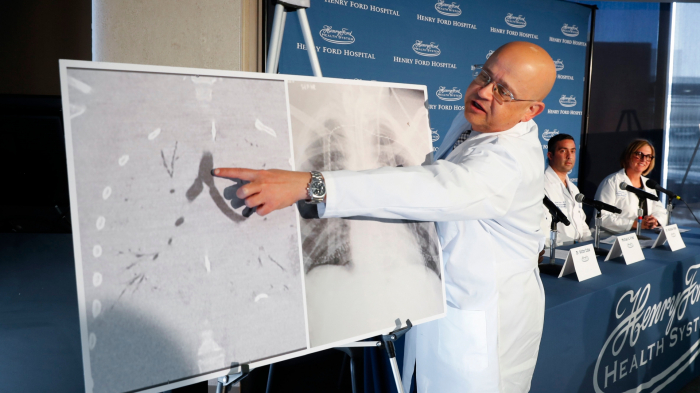The medical team from Detroit's Henry Ford Hospital said the patient, a 17-year-old male, underwent the roughly six-hour transplant surgery October 15.
He spent a month on a life-support machine after suffering "complete lung failure" and would have faced "certain death" without the operation, according to the doctors.
The teen's family described him as an athlete who was in perfect health before he was admitted to the hospital in early September with what appeared to be pneumonia. Within weeks, his condition had become so dire that he shot to the top of a national transplant list, where most patients spend months waiting for a donor.
"What I saw in his lungs was nothing that I've ever seen before, and I've been doing lung transplants for 20 years," Hassan Nemeh, the hospital's surgical director of thoracic organ transplant, said at a Tuesday news conference.
"There was an enormous amount of inflammation and scarring in addition to multiple spots of dead tissue. And the lung itself was so firm and scarred, literally we had to deliver it out of the chest," he said. "This is an evil that I haven't faced before."
The extraordinary operation underscored the severity of the public health crisis that has unfolded across the country as vaping products have surged in popularity. Vaping-related illnesses have killed at least 39 people and put more than 2,000 in the hospital since late March, when reports of vape users suffering pneumonia-like symptoms began to proliferate, according to the Centers for Disease Control and Prevention.
The CDC did not immediately return a request for comment on the surgery and whether it was the first double transplant for vaping illness.
"This is a preventable tragedy," Nemeh said. "This senseless type of product needs to be fought."
Nemeh and other doctors involved in the transplant declined to disclose whether the teen was using THC or nicotine products when he developed the symptoms, saying they wanted to protect the family's privacy. A spokesperson from Henry Ford Hospital did not immediately respond to a request for comment on the matter.
But the distinction between vaping THC products vs. those that contain only nicotine has become an increasingly important factor in the response to the illnesses, as health officials revealed recently.
After scrambling for months to figure out the root cause of outbreak, the CDC last week identified vitamin E acetate as a likely culprit. Officials said they found the sticky substance, used as a thickening agent in many black-market THC products, in all 29 samples of lung fluid they collected from patients who had fallen ill or died of vaping-related lung injuries.
While the findings did not rule out other compounds or ingredients as possible causes, officials said the discovery marked a "breakthrough" in their investigation.
Finding vitamin E acetate in 29 out of 29 samples of lung fluid was "a very strong signal" and "pretty much unheard of", Jim Pirkle, director of the laboratory science division at the CDC's National Center for Environmental Health, told The Washington Post last week.
He said vitamin E acetate is a sticky substance, like honey, that tends to "hang around" in the lung, unlike THC, which does not typically linger in lung fluid.
Health investigators say products containing THC, especially those obtained on the street or through illicit dealers, are linked to the vast majority of the illnesses they have examined.
According to the CDC, about 86 percent of 867 patients for whom relevant health data was available reported using products containing THC in the three months before they developed symptoms. Of those patients, slightly more than a third said they used those products exclusively, while 11 percent said they had only vaped nicotine.
After falling ill, the teen was first admitted to St. John Hospital on September 5. His breathing troubles rapidly worsened over the following days, and he was put on a ventilator September 12, then moved to Children's Hospital of Michigan a week later.
There he was connected to an extracorporeal membrane oxygenation device, or ECMO machine, to keep his heart and lungs working.
Doctors said the teen was close to death when they took the desperate step of adding him to the transplant list and transporting him to Henry Ford Hospital in hope that they would be able to carry out the operation in time.
Now, nearly a month after a successful surgery, he is recovering well, according to the medical team. Although he remains very weak from being sedated for so long, he is walking and eating on his own, and is expected to start rehab soon, doctors said.
The teen's family members said they hope the operation will shine a spotlight on the dangers of vaping, which some studies have shown is increasingly popular among middle and high school students.
"Within a very short period of time, our lives have been forever changed," the family said in a statement released through the hospital.
"He has gone from the typical life of a perfectly healthy 16-year-old athlete - attending high school, hanging out with friends, sailing and playing video games - to waking up intubated and with two new lungs, facing a long and painful recovery process as he struggles to regain his strength and mobility, which has been severely impacted."
The teen's long-term prognosis is unclear. The median survival rate for people who receive this type of transplant is about seven years, but many patients live 15 to 20 years or more depending on a variety of factors, according to Lisa Allenspach, medical director of Henry Ford's lung transplant program.
"We're hopeful," she said, "that given his youth and progress that happens in the future that he will be alive and well for a long time."
The Washington Post
More about: #health
















































